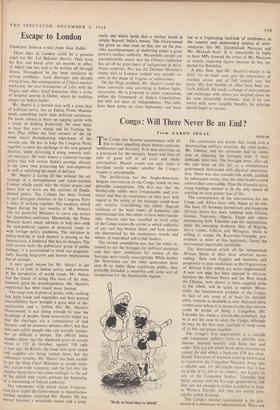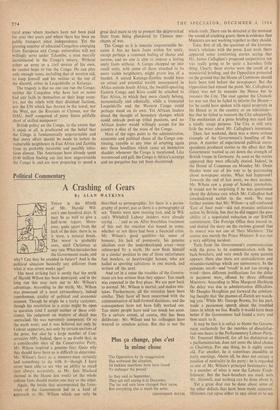an End ? Congo : Will There Never Be
From AARON SEGAL
THE Congo has become synonymous with all that is most appalling about human cynicism, indifference and brutality. It is now notorious as a graveyard for the energies, hopes and lives of men of good will of all races and many nationalities. Recent events can only make a horrified world wonder whether the Congo's trauma is interminable.
The justification for the Anglo-American- Belgian intervention in the Congo rested on two plausible assumptions. The first was that the Stanleyville rebels were irresponsible and irra- tional and that no assurances on their part with regard to the safety of the hostages could have any validity. Considering the rebels' flagrant violation of the basic tenets of humanity and international law, this seems to have been reason- able. Anyone who has travelled in rural areas of the Congo knows the extent to which authority of any sort has broken down and how actions are determined by the momentary moods and whims of. individual self-styled leaders.
The second assumption was that the rebels in- tended to use the hostageS for political purposes and that their conditions for release of the hostages were totally unacceptable. While neither the Americans nor the rebel spokesmen have seen fit to make these conditions public, they probably included a cease-fire and some sort of recognition for the Stanleyville regime.
`Well, at least they're black'
The conclusion was drawn that, faced with a deteriorating military situation, the rebel. leader, Mr. Gbenye, and his associates had no inten-. tion of releasing the hostages even if their demands were met. The hostages were, after all, the sole lease on life left to a revolutionary government threatened with physical extermina- tion. There was also considerable doubt, justified by subsequent events, that the rebel leaders could control their own rabble. Thus the dramatic para- troop landings seemed to be the only means of averting an even greater loss of life.
The consequences of the intervention for the Congo and Africa have only begun to be felt. The basic rift between the-militant and moderate African States has been widened with Guinea, Tanzania, Algeria, Egypt and others denouncing both Tshombe and the intervention, while the .emerging moderate bloc of Nigeria, Sierra Leone, Liberia and Malagasy, which is willing to accept the Kasavubu-Tshombe gov- ernment as more or less legitimate, found the intervention regrettably justifiable.
The intervention struck all the independent African States at their most sensitive nerve- ending : their own fragility and weakness and propensity to pass resolutions in the Organisation of African Unity which are never implemented. A new raw edge has been exposed in relations between the African States and the West which the Chinese, now shown to have supplied arms to the rebels, will be quick to exploit. Mean- while, the fundamental problem of the Congo, its lack of any sense of or basis for national unity, remains as insoluble as ever. National unity cannot exist where it is inconceivable that anyone could be proud of being a Congolese. Mr. Tshombe has made a remarkable comeback, but he is not the man to unite the Congo, although he may be the best man available to keep some of its bits and pieces together.
The Congo's first requirement is a reliable and competent military force to provide con- tinuous internal security and basic law and order. This is a job which hired white mercenaries cannot do and which a bankrupt UN has aban- doned. Two years of intensive training have failed to transform the Congolese National Army into a reliable unit, for the simple reason that it has no pride in its job or its country, nor loyalty to any of the Congolese leaders. Tshombe, had better success with his Katanga gendarmerie, but they are not enough to police a country as large as Western Europe, and they are useful prin- cipally within Katanga.
The Congo's second requirement is the pro- vision of a minimum of administration. There are rural areas where teachers have not been paid for over two years and where there has been no public transport since independence. Yet the growing number of educated Congolese emerging from European and Congo universities will not willingly serve under Tshombe, a man morally incriminated in the Congo's misery. Without either an army or a civil service of his own, he cannot hope to run the Congo. He can play only enough tunes, including that of western aid, to keep himself and his retinue at the top of the discord, either in Leopoldville or Katanga.
The tragedy is that no one can run the Congo; neither the Congolese who have lost or never had any faith in themselves or their huge coun- try, nor the rebels with their dissident factions, nor the UN which has thrown in the towel, nor the West, nor the Russians or Chinese, nor the OAU, itself composed of puny States pitifully short of skilled manpower.'
British policy on the Congo, to the extent that it exists at all, is predicated on the belief that the Congo is fundamentally ungovernable and that every effort should be made to isolate its vulnerable neighbours in East Africa and Zambia from its probably incurable and possibly infec- tious disease. The Americans have already spent £140 million finding out just how ungovernable the Congo is and are now preparing to spend a great deal more to try to prevent the shipwrecked State from being plundered by Chinese mer- chants of war.
The Congo as it is remains ungovernable be- cause it has no basis from within for unity, except perhaps a common feeling of shame and sorrow, and no one is able to impose a lasting unity from without. A Congo chopped up into small units, with some of them attached to its more viable neighbours, might prove less of a burden. A united Katanga-Zambia would have an actual and potential wealth unsurpassed in Africa outside South Africa, the Swahili-speaking Eastern Congo and Kivu could be attached to East Africa, to which they more closely belong, economically and ethnically, while a truncated Leopoldville and the Western Congo could perhaps stand on its own. Yet African leaders dread the thought of boundary changes which could unleash pent-up tribal passions, and no African leader would willingly accept for his country a slice of the woes of the Congo.
Most of the signs point to the administrative, economic and political chaos of the Congo con- tinuing, capable at any time of erupting again into those headlines which cause an instinctive shudder whenever the Congo is mentioned. Like wormwood and gall, the Congo is Africa's scourge and no purgative has yet been discovered.



































 Previous page
Previous page